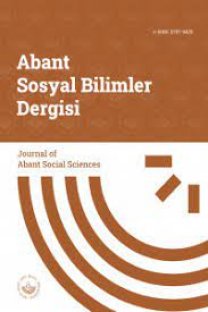MEVSİMSELLİK VE ÖZNEL İYİ OLUŞ ARASINDAKİ İLİŞKİNİN İNCELENMESİ
Bu çalışmada, mevsimsellik ve öznel iyi oluş arasındaki ilişkinin, literatürde yer alan bilgiler ışığında ayrıntılı olarak incelenmesi amaçlanmıştır. Mevsimsel değişimlerin kişileri psikolojik yönden oldukça etkilediği göz önünde bulundurularak, mevsimlere bağlı olarak görülen hava koşullarındaki değişimlerin olumlu ve olumsuz duygular üzerindeki etkisi incelenmektedir. Yapılan birçok araştırma bulgusu da, mevsimsellik ve öznel iyi oluş, yani mutluluk arasında negatif yönde anlamlı ilişki bulunduğunu göstermiştir. Araştırmacı tarafından gerçekleştirilen çalışma bulguları da, literatür bilgisi ile tutarlılık göstermekte ve değişkenler arasındaki negatif ilişkiyi desteklemektedir. Ayrıca, araştırmacı tarafından mevsimsellik ve öznel iyi oluş arasındaki ilişkinin incelendiği bu çalışmada, iki değişken arasındaki ilişkiyi inceleyen bir kuramın literatürde yer almaması nedeniyle, bu değişkenler arasındaki ilişki Bağ Kuramı ve Duygusal Kararsızlık Kuramı çerçevesinde ele alınmıştır.
Anahtar Kelimeler:
Mevsimsellik, Öznel İyi Oluş, Psikolojik Semptom
___
- American Psychiatric Association (2013). ‘DSM 5’. American Psychiatric Association.
- Arendt, Josephine (2012). ‘Biological rhythms during residence in polar regions’. Chronobiology international 29(4): 379-394.
- Bakım, Bahadır, Karaahmet, Elif, Altınbaş, Kürşat ve Oral, Timuçin (2013). ‘Winter sale on lithium levels: the impact of seasonality’. Bulletin of Clinical Psychopharmacology 23(4): 315-319.
- Bjorvatn, Bjørn ve Pallesen, Ståle (2009). ‘A practical approach to circadian rhythm sleep disorders’. Sleep Medicine Reviews 13(1): 47-60.
- Bozkırlı, Kürşat Çağrı (2013). ‘Prof. Dr. Kemal Yavuz ve Hâcip Böyle Dedi Kutadgu Bilig’den Seçmeler Adlı Eseri Üzerine’. Uluslararası Türkçe Edebiyat Kültür Eğitim (TEKE) Dergisi 2(2).
- Chellappa, Sarah Laxhmi, Schröder, Carmen ve Cajochen, Christian (2009). ‘Chronobiology, excessive daytime sleepiness and depression: Is there a link?’ Sleep medicine 10(5) : 505-514.
- Diener, Ed (1984). ‘Subjective well-being’. Psychological Duletin 95(3) : 542-575.
- Diener, Ed, Suh, Eunkook ve Oishi, Shieghiro (1997). ‘Recent findings on subjective well-being’. Indian Journal of Clinical Psychology 24(1) : 25-41.
- Ekinci, Mine, Okanlı, Ayşe ve Gözüağca, Derya (2005). ‘Mevsimsel Depresyonlar ve Baş Etme Yolları’. Anadolu Hemşirelik ve Sağlık Bilimleri Dergisi/Journal of Anatolia Nursing and Health Sciences 8(1).
- Freedman, J. L., Sears, David O. ve Carlsmith, J. M. (2003). Sosyal Psikoloji. Çev. A. Dönmez. Ankara: İmge kitabevi.
- Hamurcu, Habib (2011). Ergenlerin yetkinlik inançları ve psikolojik iyi oluşlarını yordamada psikolojik ihtiyaçlar. Yayımlanmamış Doktora Tezi. Konya: Selçuk Üniversitesi.
- Kiremitçi, Elvan (2016). Üniversite Öğrencilerinde Mevsimsellik ve Öznel İyi Oluş İlişkisinin Psikolojik Semptomlara Göre İncelenmesi. Yayımlanmamış Yüksek Lisans Tezi. Bolu: Abant İzzet Baysal Üniversitesi/Sosyal Bilimler Enstitüsü.
- Lambert, Gavin W. vd. (2002). ‘Effect of sunlight and season on serotonin turnover in the brain’. The Lancet 360(9348): 1840–1842.
- Myers, David G. ve Diener, Ed (1995). ‘Who is happy?’ Psychological science 6(1): 10-19.
- Pinchasov Boris B. vd. (2000). ‘Mood and energy regulation in seasonal and non-seasonal depression before and after midday treatment with physical exercise or bright light’. Psychiatry Research 94(1): 29–42.
- Reinberg, Alain ve Ashkenazi, Israel (2003). ‘Concepts in human biological rhythms’. Dialogues in clinical neuroscience 5(4): 327.
- Roecklein, Kathryn A. ve Rohan, Kelly J. (2005). ‘Seasonal affective disorder: an overview and update’. Psychiatry (Edgmont) 2(1): 20.
- Rohan, Kelley J., Evans, Maggie, Mahon Jennifer N., Ho Sheau-Yan, Nillni, Yael I, Postolache, Teodor T. Ve Vacek Pamela (2013). ‘Cognitive-behavioral therapy vs. light therapy forenting winter depression recurrence: study protocol for a randomized controlled trial’. Trials 14(1): 82.
- Rosenthal, Norman E. Sack, David A., Gillin, Chrstian J., Lewy, Alfred J, Goodwin, Frederick K., Davenport, Yolande, Mueller, Peter, Newsome, David A. ve Wehr, Thomas A. (1984). ‘Seasonal affective disorder: a description of the syndrome and preliminary findings with light therapy’. Archives of General Psychiatry 41(1): 72-80.
- Ryan, Richard M. ve Deci, Ed L. (2001). ‘On happiness and human potentials: A review of research on hedonic and eudaimonic well-being. Annual review of psychology 52(1): 141-166.
- Schimmack, Ulrich, Radhakrishnan, Phanikiran, Oishi, Shigehiro, Dzokoto, Vivian ve Ahadi Stephan (2002). ‘Culture, personality, and subjective well-being: integrating process models of life satisfaction’. Journal of personality and social psychology 82(4): 582.
- Schulz, Pierre ve Steimer, Thierry (2009). ‘Neurobiology of circadian systems. CNS drugs 23(2): 3-13.
- Selvi, Yavuz, Beşiroğlu, Lütfullah ve Aydın, Adem (2011). ‘Kronobiyoloji ve Duygudurum Bozuklukları’. Psikiyatride Güncel Yaklasimlar 3(3): 368-386.
- Simrén, Magnus (2002). ‘Quality of life in inflammatory bowel disease in remission: the impact of IBS like symptoms and associated psychological factors.’ The American journal of gastroenterology 97(2): 389-396.
- Seligman, Martin E. ve Csikszentmihalyi, Mihaly (2000). ‘Positive psychology: An introduction’. American Psychological Association.
- Turner, Adrian, Beales, James, Faure, Sebastien, Dunford, Roy P. ve Laurie David (2005). ‘The pseudo response regulator Ppd-H1 provides adaptation to photoperiod in barley’. Science 310(5750): 1031-1034.
- Walton, Gregory M. ve Cohen, Geoffrey L. (2011). ‘A brief social-belonging intervention improves academic and health outcomes of minority students’. Science 331(6023): 1447-1451.
- Wirz-Justice, Anna (2006). ‘Biological rhythm disturbances in mood disorders’. International Clinical Psychopharmacology 21: 11-15.
- Yayın Aralığı: Yılda 3 Sayı
- Başlangıç: 2000
- Yayıncı: Abant İzzet Baysal Üniversitesi Sosyal Bilimler Enstitüsü
Sayıdaki Diğer Makaleler
SOSYAL SERMAYE VE SÜRDÜRÜLEBİLİR KALKINMA: AB ÜYESİ ÜLKELER İÇİN BİR ANALİZ
MALİ KURALLAR VE TEORİK TEMELLERİ ÜZERİNE BİR İNCELEME
KAMU HİZMETLERİNDEN MEMNUNİYETİN ÇOK BOYUTLU ÖLÇEKLEME İLE ANALİZİ
PAPALIK TARİHİNDEN BİR KESİT: IX. PİUS DÖNEMİNDEKİ DİNİ VE SİYASİ GELİŞMELER
BİREYSEL VE SOSYAL BAŞARI MOTİVASYONUNU AÇIKLAYAN TEMEL DEĞERLER: BİR ALAN ARAŞTIRMASI
Ali Murat ALPARSLAN, Seher YASTIOĞLU, Mehmet Ali TAŞ
ORTA GELİR TUZAĞI: AMPİRİK BİR ÇALIŞMA
MEVSİMSELLİK VE ÖZNEL İYİ OLUŞ ARASINDAKİ İLİŞKİNİN İNCELENMESİ
İŞ YAŞAMINDA SANAL KAYTARMANIN KİŞİLİK VE BAZI DEMOGRAFİK DEĞİŞKENLERLE İLİŞKİSİNİN İNCELENMESİ
